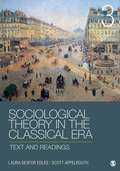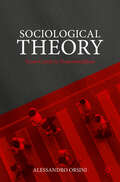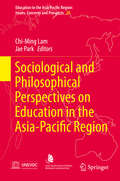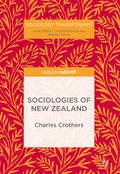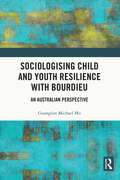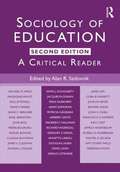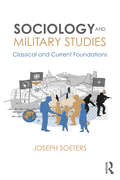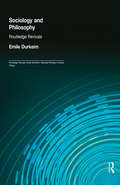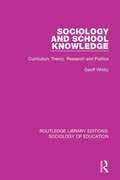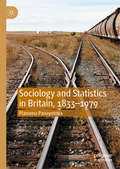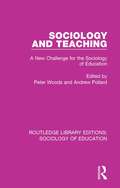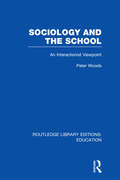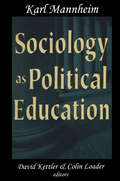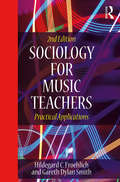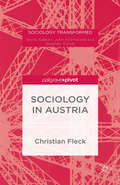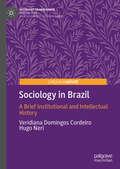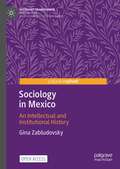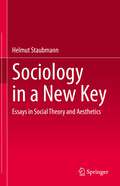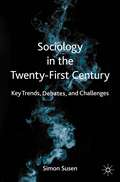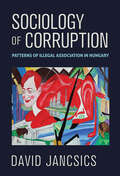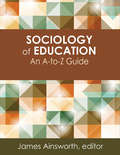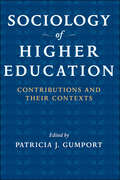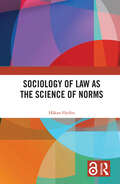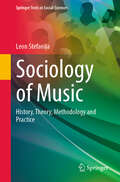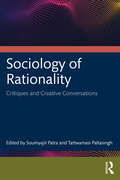- Table View
- List View
Sociological Theory in the Classical Era 3rd Edition
by Laura Desfor Edles Scott AppelrouthSociological Theory in the Classical Era introduces students to original major writings from sociology's key classical theorists. It also provides a thorough framework for understanding these challenging readings. For each theorist, the authors give a biographical sketch, discuss intellectual influences and core ideas, and offer contemporary examples and applications of those ideas. Introductions to every reading provide additional background on their structure and significance.
Sociological Theory: From Comte to Postcolonialism
by Alessandro OrsiniThis textbook analyses the work of classical and contemporary sociological theorists. The first part is dedicated to Comte, Spencer, Marx, Durkheim, Weber, Pareto, and Simmel. The second part covers the major contemporary sociological perspectives: Functionalism, Marxism, Conflict Theory, Symbolic Interactionism, Phenomenological Sociology, and Rational Choice Theory. The third part is devoted to Postmodern Theory, Feminist Theory, Postcolonial Theory, and Race Theory. The author combines academic rigour with clear and accessible language, offering students an in-depth and extensive overview of the main, recurring problems that have troubled sociological theory from its origins to the present day. The textbook uses contemporary examples, analysing how sociological theory can explain the most tragic phenomena of our time, including the war in Ukraine, the Israeli-Palestinian conflict, US-China competition over Taiwan, nuclear proliferation, radicalization, neofascism, white suprematism, jihadism, and terrorism. With pedagogic features aiding learning, this book helps navigate the various approaches, methods, and research that divide sociologists into distinct schools. This textbook is therefore an invaluable tool to any sociology student looking to gain a comprehensive understanding of the foundational thinkers that have shaped the discipline.
Sociological and Philosophical Perspectives on Education in the Asia-Pacific Region
by Chi-Ming Lam Jae ParkThis book demonstrates the value of approaching education from a sociological and philosophical perspective. Specifically, it addresses current and long-standing educational issues in the Asia-Pacific region, integrating sociological and philosophical insights with practical applications in four key areas: educational aims, moral education, educational policy, and the East-West dichotomy. It discusses educational aims in terms of rationality, philosophical thinking, and sustainable development and presents the literary, religious, and analytical approaches to moral education. Four educational policies are then considered: Hong Kong's language policy, Hong Kong's policy on the internationalization of education, East Asia's policies on English education, and Australia's policy on teacher education. Different aspects of the East-West dichotomy are analysed: Confucian rationalism versus Western rationalism, Confucian learning culture versus Western learning culture, and Asian research methodology versus Western research methodology. Taken as a whole, the book shows that issues in education are rarely simple, and looking at them from multiple perspectives allows for rich and informed debates. It presents a rare philosophical and sociological analysis of the cultures and experiences of education in the Asia-Pacific region, and promotes research that leads to more culturally rooted educational policies and practice.
Sociologies of New Zealand (Sociology Transformed)
by Charles CrothersThis book provides the first comprehensive analysis of the various sociologies of New Zealand from the late 19th century to the present day. Opening with previously undocumented insights into the history of proto-sociology in New Zealand, the book then explores the parallel stories of the discipline both as a mainstream subject in Sociology departments and as a more diffuse ‘sociology’ within other university units .The rise and fall of departments, specialties and research networks is plotted and the ways in which external and internal factors have shaped these is explained. Different generations of sociologists, including many immigrants, are each shown to have left their unique mark on New Zealand sociology. The author demonstrates that the rising interest in topics specific to New Zealand has been accompanied by increasing capacities to contribute to world sociology. This book will have inter-disciplinary appeal across the social sciences and provides a valuable study of the development of sociology in a semi-peripheral country.
Sociologising Child and Youth Resilience with Bourdieu: An Australian Perspective
by Guanglun Michael MuIn this book, Mu crafts a sociology of resilience through his multi-year research with Australian students. The content is not merely concerned with individual achievements in precarious conditions but also ponders over transformative, reflexive, and power-rejective everyday practices that make social change possible, probable, and even inevitable. Since Emmy Werner and her colleagues discovered the "self-righting" and "invincible" children on the Hawaiian island of Kauai who fared well despite exposure to significant household risks, positive psychology has markedly advanced the knowledge about child and youth resilience to adversities. Yet, many children and adolescents continue to slide through system cracks. This fact does not invalidate psychology of resilience; rather, it urges new frameworks to break the reproductive circle of inequality. Reframing the traditional psychological notion of resilience through recourse to Bourdieu’s relational and reflexive sociology, the book moves beyond individual adaptation to adverse conditions and takes a deep dive into sociological resilience to structural problems. It offers school professionals and educational researchers an epistemological tool to reapproach resilience and reappropriate Bourdieu for social change. Offering scholarship that will interest researchers in the areas of child and youth resilience, sociology of resilience, and sociology of education, the volume is written to engage with the intellectual work of both established scholars and emerging researchers within Australia and beyond. The empirical analyses also provide useful insights for educational professionals in schools and resilience researchers in universities.
Sociology Of Education: A Critical Reader 2nd Ed
by Alan R. Sadovnik Ryan CoughlanThis comprehensive and bestselling Reader examines the most pressing topics in sociology and education while exposing students to examples of sociological research on schools. Drawing from classic and contemporary scholarship, noted sociologist Alan R. Sadovnik has chosen readings that examine current issues and reflect diverse theoretical approaches to studying the effects of schooling and society. The second edition provides students with seven new readings from some of the best theorists and researchers in education including James S. Coleman, Madeleine Arnot, and Claudia Buchman. Through full, rather than excerpted primary source readings, students have the opportunity to read sociological research as it is written and engage in critical analyses of readings in their entirety. Including comprehensive section introductions, questions for reflection and discussion, and suggested readings, Sociology of Education will stimulate student thinking about the important roles that schools play in contemporary society and their ability to solve fundamental social, economic and political problems.
Sociology and Military Studies: Classical and Current Foundations (Cass Military Studies)
by Joseph SoetersThis book examines the connection between sociology and the challenges faced by the modern military. Military sociology has received little attention in the broader academic world, and is mostly focused on civil-military relations. This book seeks to address this gap and combines ideas, theories and insights from sociology’s founding authors, with each chapter focusing on a specific thinker. There are chapters on Max Weber, Emile Durkheim, Karl Marx, Georg Simmel, Jane Addams, W. E. B. Du Bois, Erving Goffman, Michel Foucault, Morris Janowitz, Norbert Elias, Cornelis Lammers, Arlie Russell Hochschild, Cynthia Enloe and Bruno Latour, and each essay discusses their ideas and theories in relation to topics that are of concern in and around the military today. Military studies are taken in a broad sense here, so the volume encompasses a wide range of issues, including civil-military relations, military-political affairs, performance and outcomes of military operations, and organizational arrangements including technology and the composition, performance and well-being of personnel. The book intends to provide views and insights that will help the military to innovate their organizations and practices, not necessarily in the usual functional way of innovating (i.e. faster, more precise, etc.) but in a broader way. This book will be of great interest to students of sociology, military studies, civil-military relations, war and conflict studies, and IR in general.
Sociology and Philosophy (Routledge Revivals: Emile Durkheim: Selected Writings in Social Theory)
by Emile DurkheimFirst published in English in 1953, this volume represents a collection of three essays written by seminal sociologist and philsopher Emile Durkheim in which he puts forward the thesis that society is both a dynamic system and the seat of moral life. Each essay stands alone, but their connecting thread is the dialectic demonstration that a phenomenon, be a sociological or psychological one, is relatively independent of its matrix. The essays provide a valuable insight into Durkeheimian thought on sociological and philsophical matters and offer an excellent guide to Durkheim for students of both disciplines.
Sociology and School Knowledge: Curriculum Theory, Research and Politics (Routledge Library Editions: Sociology of Education #59)
by Geoff WhittyThe rise of a radical ‘new’ sociology of education during the early 1970s focused attention on the nature of school knowledge. Although this new approach was set to revolutionize the subject, within a few years, many people considered these developments an eccentric interlude, with little relevance to curriculum theory or practice. First published in 1985, this book offers a more positive view of the new sociology of education and its contribution to our understanding of the curriculum. In doing so, it argues that some of the radical promise of the new sociology of education could be realised, but only if sociologists, teachers and political movements of the left work more closely together.
Sociology and Statistics in Britain, 1833–1979
by Plamena PanayotovaAt the beginning of the twentieth century, Britain stood at the forefront of science and statistics and had a long and respected tradition of social investigation and reform. But it still did not yet have a ‘science of society.’ When, in the early 1900s, a small band of enthusiasts got together to address this situation, the scene was set for a grand synthesis. No such synthesis ever took place and, instead, British sociology has followed a resolutely non-statistical path. Sociology and Statistics in Britain, 1833-1979 investigates how this curious situation came about and attempts to explain it from an historical perspective. It uncovers the prevalence of a deep and instinctive distrust within British sociology of the statistical methodology and mindset, resulting in a mix of quiet indifference and active hostility, which has persisted from its beginnings right up to the present day. While British sociology has thrived institutionally since the post-war expansion of higher education, this book asks whether or not it is poorer for having failed to recognise that statistics provides the foundations for the scientific study of society and for having missed opportunities to build upon those foundations. Ultimately, this important, revealing and timely book is about British sociology’s refusal to come to grips with a modern scientific way of thinking which no discipline that aspires to an effective study of society can afford to ignore.
Sociology and Teaching: A New Challenge for the Sociology of Education (Routledge Library Editions: Sociology of Education #61)
by Andrew Pollard Peter WoodsFirst published in 1988, this work considers the ways in which the sociology of education can inform educational practice. It examines the research which marries the two fields and considers the thinking behind it. It addresses key themes such as: sociological awareness or imagination, and how it might be stimulated and enriched by educational study; reflectivity for both teachers and sociologists; and ethnography, the major research orientation behind most of these studies.
Sociology and the School (Routledge Library Editions: Education)
by Peter WoodsThis is an introduction to interactionist work in education during the 1970s and 80s. The interactionist viewpoint concentrates on how people construct meanings in the ebb and flow of everyday life – what they think and do, how they react to one another – and has in recent years established itself as one of the leading approaches in education. It has generated illuminating research studies which, by being firmly based in the real world of teaching and dealing with the fine-grained details of school life, have helped to break down the barriers between teacher and researcher. This volume presents the results of this valuable work, within a coherent theoretical framework, by focusing on the major interactionist concepts of situation, perspectives, cultures, strategies, negotiation and careers. By bringing them together in this way, the author demonstrates their collective potential for the deeper understanding of school life and the possibilities for sociological theory. His book therefore offers both a summary of and a reflection on achievement in the area of interactionism as it relates to schools.
Sociology as Political Education: Karl Mannheim in the University
by Karl MannheimGerman professors and academic intellectuals are often blamed for passivity or complicity in the National Socialist rise to power. Karl Mannheim was a leading representative of a vital minority of university personalities who devoted themselves to making sociology and higher education contribute to democratization. Sociology as Political Education is both an analytical account of Mannheim's efforts as well as an illustration of the application of sociological knowledge to the world of practical action. Together with a second biographical volume by the editors, forthcoming next season, it comprisesa complete record of Karl Mannheim in the university life of the Weimar period.The comparatively new discipline of sociology was looked upon with favor by the Weimar Republic's reformers of higher education. In advancing its methods Mannheim had first to contend first with prominent and influential figures who attacked sociology as a mere political device to undermine cultural and national values for the sake of narrow interests and partisanship. He then had to meet the objections of fellow sociologists who were convinced that the discipline could prosper only as an area of specialized study with no claim to educational goals beyond the technical reproduction. Finally, he had to separate himself from proponents of politicized sociology. Sociological thought should be rigorous, critical, and attentive to evidence, but, Mannheim argued, its system had to be open and congruent with the ultimate responsibility of human beings for their acts.Loader and Kettler supplement Mannheim's groundbreaking volume with previously untranslated Mannheim texts, among them a transcript of his 1930 sociology course in which Mannheim answered his critics and clarified his intentions. Sociology as Political Education is not only of historical significance, but also shows Mannheim's relevance for current discussions of academic integrity and politicization. This volume will be of interest to sociologists, cultural historians, and political scientists.
Sociology for Music Teachers: Practical Applications
by Gareth Dylan Smith Hildegard C. FroehlichFor upper level undergraduate and introductory graduate and doctoral courses in music education. Outlining the basic aspects, constructs and concepts relevant to understanding music teaching and learning from a sociological perspective, this volume introduces students to the discipline as a tool in understanding their own work. The text shows how certain academics in music, sociology and education have thought about the relationship of music to education, schooling and society and examines the consequences of such thinking for making instructional choices in teaching methods and repertoire selection. School music teaching is imbedded in two major societal traditions: (1) the tradition of music making, listening, and responding; and (2) the tradition of education as a societal mandate. The first tradition holds firmly to music artistry and musicological scholarship, the latter of which includes music sociology. The second tradition, that of education as a field of study, relies mostly on pedagogical principles rooted equally in psychology and sociology. Hildegard Froehlich bases the book upon the premise that a music teacher's work is equally shaped by both traditions. The more music teachers become aware of how societal structures shape their own lives as well as the lives of their students, colleagues, and superiors; the more "reality-based" their teaching will become. Society is a composite of communities in which different social classes, groups, and reference groups co-exist-to varying degrees of compatibility due to real or perceived differences in norms and values as well as hierarchies of power. Informed or intuitive choices made by an individual indicate allegiances to particular groups, how those groups are structured hierarchically; and where and how each individual fits into those hierarchies. This is true for the music world as it is true for the world of education.
Sociology in Austria since 1945 (Sociology Transformed)
by C. FleckSociology in Austria has been frequently affected by political developments in the country. This first history of sociology in Austria examines the impact of the break-up of the Habsburg Empire and of two consecutive dictatorships, which destroyed academic freedom by means of forced migration and imprisonment. Even after 1945 the re-established Second Republic did not dismiss professors promoted during the Nazi period, and failed to invite exiled academics to return home. The author argues that the result has been a continuation of favouritism and conformism, with compliance to political regimes sanctioned at the expense of meritocracy and that in the light of this chequered past we should celebrate instances of de-institutionalization.
Sociology in Brazil: A Brief Institutional and Intellectual History (Sociology Transformed)
by Veridiana Domingos Cordeiro Hugo NeriThis book provides an overview of the institutional and intellectual development of sociology in Brazil from the early 1900s to the present day; through military coups, dictatorships and democracies. It charts the profound impact of sociology on Brazilian public life and how, in turn, upheavals in the history of the country and its universities affected the its scientific agenda. This engaging account highlights the extent of the discipline’s colonial inheritance, its early institutionalization in São Paulo, and its congruent rise and fall during repeated regime changes. The authors’ analysis draws on original research that maps the concentration of research interests, new developments, publications and centers of production in Brazilian sociology, using qualitative and quantitative data. It concludes with a reflection on the potential impact of the recent far-right turn in Brazilian politics on the future of the discipline. This book contributes a valuable country study to the history of sociology and will appeal to a range of social scientists in addition to scholars of disciplinary historiography, intellectual and Brazilian history.
Sociology in Mexico: An Intellectual and Institutional History (Sociology Transformed)
by Gina ZabludovskyThis open access book presents a condensed history of Sociology in Mexico from its origins, through to the middle of the 19th century and up to the present day. The book analyses the interaction between sociology and the main economic, political and social change in the country, including the 1910 Mexican Revolution, the main social movements, the role of the intellectual exiles from Spain and Latin America, and the participation of women, who have often remained invisible in the history of sociology. The book explores how sociological discourse played a fundamental role in the separation of secular and public education and the search for a ‘national project’ from 1868 onwards, despite the lack of an institute of social research until 1930; how sociology became an autonomous social science, led by a few intellectuals and public figures, as it became institutionalized in universities, and the effect this had on the development of the discipline; the influence of Marxism during the 1970s; and the progression from a process of specialization after the fall of the Berlin Wall to a new trend of working in collective projects with an increasing interdisciplinary perspective in the first decades of the 21st century.
Sociology in a New Key: Essays in Social Theory and Aesthetics
by Helmut StaubmannThis book presents essays that address fundamental issues in social and cultural theory by viewing them through the lens of aesthetic theory. Drawing on the aesthetic theories of Theodor W. Adorno, Gregory Bateson, Jean-Marie Guyau, Talcott Parsons and Georg Simmel, it suggests a new take on basic sociological concepts and methodologies. The chapters cover a wide range of topics, including the sensuality of social action, social construction of unreality, and The Rolling Stones’ enduring success as a reflection of our society and culture. The book’s title Sociology in a New Key refers to a classic work by Susanne K. Langer, whose Philosophy in a New Key argued for a reorientation of modern philosophical thought based on a thorough account of symbolism in general and of the arts in particular. In this way, the basic ideas and assumptions of the philosophical tradition are transposed to new understandings and perspectives. After all, it was Georg Simmel himself who claimed to have gained several of his general theoretical insights “via the detour of reflections on the essence of art.” The book will appeal to scholars and students of the sociology of the arts and music, and to anyone interested in the intersection of social theory and aesthetics.
Sociology in the Twenty-First Century: Key Trends, Debates, and Challenges
by Simon SusenThis book examines key trends, debates, and challenges in twenty-first-century sociology. To this end, it focuses on significant issues surrounding the nature of sociology (‘What is sociology?’), the history of sociology (‘How has sociology evolved?’), and the study of sociology (‘How can or should we make sense of sociology?’). These issues have been, and will continue to be, essential to the creation of conceptually informed, methodologically rigorous, and empirically substantiated research programmes in the discipline. Over the past years, however, there have been numerous disputes and controversies concerning the future of sociology. Particularly important in this respect are recent and ongoing discussions on the possibilities of developing new – and, arguably, post-classical – forms of sociology. The central assumption underlying most of these projects is the contention that a comprehensive analysis of the principal challenges faced by global society requires the construction of a sociology capable of accounting for the interconnectedness of social actors and social structures across time and space. This book provides a cutting-edge overview of crucial past, present, and possible future trends, debates, and challenges shaping the pursuit of sociological inquiry.‘Simon Susen – one of the most knowledgeable scholars in the contemporary social sciences – examines the key challenges with which sociology is confronted today. This book is a must-read for professional sociologists as well as for those studying the subject.’ – Luc Boltanski, École des Hautes Études en Sciences Sociales, Paris, France‘Simon Susen provides a balanced update on sociology’s theoretical, methodological, and institutional resources as well as challenges in today’s complicated local and global social worlds. Fortunately, he has innovative and practical recommendations for ensuring the cutting-edge relevance of sociological thinking. This book is an excellent choice for undergraduate and postgraduate students as well as for the general reader.’ – Sandra Harding, University of California, Los Angeles, USA ‘A comprehensive and judicious account of the intellectual and material state of sociology, based on omnivorous reading and incisive analysis. The writing is beautifully clear, and the book is a major contribution to the self-understanding of the discipline.’ – William Outhwaite, Newcastle University, UK
Sociology of Corruption: Patterns of Illegal Association in Hungary
by David JancsicsIn Sociology of Corruption, David Jancsics provides a fresh approach to the study of corruption in Hungary, which once seemed to be the most likely of the ex-communist bloc nations to catch up to the West and is, according to many experts and scholars, a country with a highly corrupt dynamic.Based on data from 2022, Hungary is now the most corrupt member state of the European Union. There is also a consensus among experts that a small clique of corrupt political actors has captured most Hungarian state institutions and a significant portion of the business sector. What fostered corruption in Hungary? What are the most typical forms of corruption in this country? What do Hungarians think about it? What is the role of prime minister Viktor Orbán in this? Sociology of Corruption proposes a novel sociological theory of corruption focusing on social status and relationships, network structures, and power dynamics as important explanatory factors of corrupt behavior. Although his focus is on Hungary, Jancsics's findings are applicable to other nations and cultural contexts.
Sociology of Education: An A-to-Z Guide
by James AinsworthThe sociology of education is a rich interdisciplinary field that studies schools as their own social world as well as their place within the larger society. The field draws contributions from education, sociology, human development, family studies, economics, politics and public policy. Sociology of Education: An A-to-Z Guide introduces students to the social constructions of our educational systems and their many players, including students and their peers, teachers, parents, the broader community, politicians and policy makers. The roles of schools, the social processes governing schooling, and impacts on society are all critically explored. Despite an abundance of textbooks and specialized monographs, there are few up-to-date reference works in this area. Features & Benefits: 335 signed entries fill 2 volumes in print and electronic formats, providing the most comprehensive reference resource available on this topic. Cross-References and Suggestions for Further Reading guide readers to additional resources. A thematic "Reader's Guide" groups related articles by broad topic areas as one handy search feature on the e-Reference platform, which also includes a comprehensive index of search terms, facilitating ease of use by both on-campus students and distance learners. A Chronology provides students with historical perspective on the sociology of education.
Sociology of Higher Education: Contributions and Their Contexts
by Patricia J. GumportIn this volume, Patricia Gumport and other leading scholars examine the sociology of higher education as it has evolved since the publication of Burton Clark's foundational article in 1973. They trace diverse conceptual and empirical developments along several major lines of specialization and analyze the ways in which wider societal and institutional changes in higher education have influenced this vital field of study.In her own chapters, Gumport identifies the factors that constrain or facilitate the field's development, including different intellectual legacies and professional contexts for faculty in sociology and in education. She also considers prospects for the future legitimacy and vitality of the field.Featuring extensive reviews of the literature, this volume will be invaluable for scholars and students of sociology and higher education.
Sociology of Law as the Science of Norms (Studies in the Sociology of Law)
by Håkan HydénThis book proposes the study of norms as a method of explaining human choice and behaviour by introducing a new scientific perspective. The science of norms may here be broadly understood as a social science which includes elements from both the behavioural and legal sciences. It is given that a science of norms is not normative in the sense of prescribing what is right or wrong in various situations. Compared with legal science, sociology of law has an interest in the operational side of legal rules and regulation. This book develops a synthesizing social science approach to better understand societal development in the wake of the increasingly significant digital technology. The underlying idea is that norms as expectations today are not primarily related to social expectations emanating from human interactions but come from systems that mankind has created for fulfilling its needs. Today the economy, via the market, and technology via digitization, generate stronger and more frequent expectations than the social system. By expanding the sociological understanding of norms, the book makes comparisons between different parts of society possible and creates a more holistic understanding of contemporary society. The book will be of interest to academics and researchers in the areas of sociology of law, legal theory, philosophy of law, sociology and social psychology.
Sociology of Music: History, Theory, Methodology and Practice (Springer Texts in Social Sciences)
by Leon StefanijaThe textbook provides students with insight into and overview of the basics of social research on music. It addresses the Who, What, When, Where, Why, How of music research through four perspectives from the sociological study of music: a historical survey of the social study of music (when), theoretical points of view (what), and methodological (how), and pragmatic aspects (who, why & how). The other Ws (where and why) are included within the four main perspectives. The four perspectives – history, theory, methodology, and practice – are complementary. Some of the names included in the theory and practice of music are also listed as a part of the history of music sociology, and vice versa. In this way, the book encompasses what Howard S. Becker has conceptualized as an art world, Kurt Blaukopf as musical practice, and Christopher Small as musicking. Covering all the relevant details yet concise in structure, this book is ideal for students of the sociology of music, musical education, musicology and of arts and aethestics.
Sociology of Rationality: Critiques and Creative Conversations
by Soumyajit Patra Tattwamasi PaltasinghThis book is a socio-historical analysis of rationalism as a world view – that guides many of our actions in concrete everyday life – and as a philosophy – that guides our epistemological understanding of the reality around us. It explores the multifaceted manifestations of the idea in the Enlightenment philosophy, modern sociological theorising and post-structural standpoints. The volume also critiques rationality from feminist, subaltern and postcolonial perspectives. Finally, it delves into the multi-layered sociological significances of rationalisation of different domains of life. Transdisciplinary in scope and with essays by foremost scholars in the field, this volume will be a major intervention across the humanities and the social sciences. It will be of interest to students and researchers in sociology, anthropology, history, philosophy, gender studies, political science, cultural anthropology, education, and religious studies.
